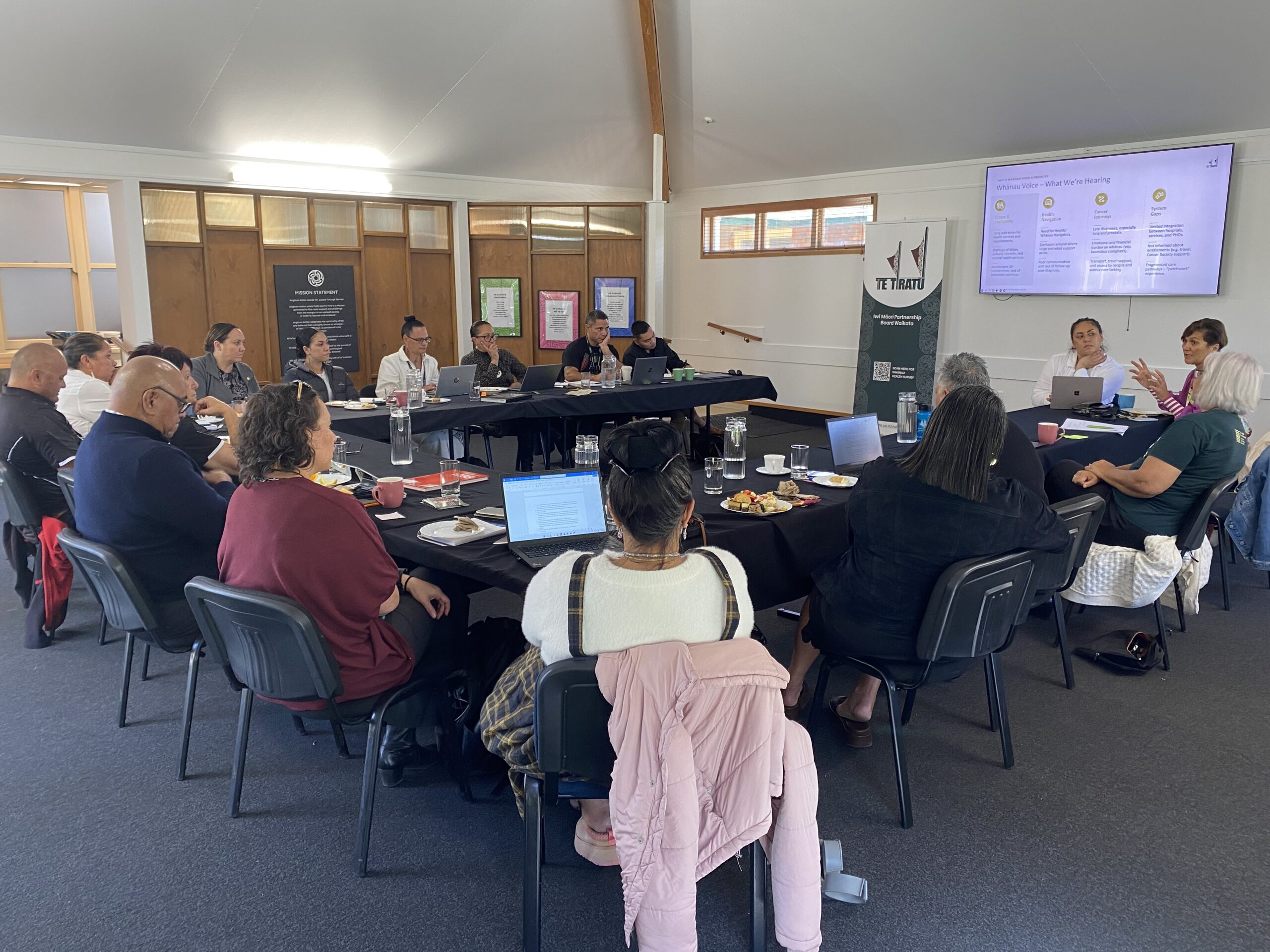Ethos Café in Hamilton provided the perfect backdrop for a powerful first forum hosted by Te Tiratū bringing together a diverse group of health service providers both Māori and mainstream, all committed to transforming outcomes for whānau Māori.
In what participants described as a much needed wānanga, the gathering offered a valuable opportunity to share insights, reconnect with kaupapa Māori approaches to health, and explore how collective action can drive change. It also allowed Te Tiratū Tumu Whakarae, Brandi Hudson to showcase the mahi of the Iwi Māori partnership Board to the providers, strengthening ties across the sector.
At the heart of the discussion was Whānau Voice — a critical reporting tool developed by all Iwi Māori Partnership Boards (IMPBs) to meet obligations under the Pae Ora Act. Providers acknowledged the potential of Whānau Voice to be powerful in advocacy when influencing Te Whatu Ora’s policies, planning, and resourcing — particularly around cancer care, screening, and primary care. Te Tiratū is specifically surveying whānau currently using Whānau Voice on their experiences of primary care and/or cancer screening and treatment.

However, the forum also surfaced shared frustrations: much of the data currently collected ends up buried in compliance reporting, with little meaningful action taken. “We’re ticking boxes, not transforming outcomes,” one provider noted. There was strong consensus that this could — and should — change, and that collaboration is the key.
“We want to work smarter, not harder,” was a recurring theme, especially around data sovereignty, coordination, and the need for intentional and culturally grounded collection methods.
A System Struggling, Whānau Paying the Price
Many participants voiced deep concern about the ongoing challenges whānau face navigating a fragmented and under-resourced health system. From late-stage cancer diagnoses to traumatic hospital experiences, the stories shared painted a powerful picture of a system that is not working—especially for Māori.
Several attendees noted that the current model is failing to keep pace with the lived realities of Māori communities. With the Māori population in Waikato continuing to grow, serious questions were raised about the system’s readiness to care for a rising number of kaumātua—and what actions need to be taken now to prepare for the future.
The importance of strong, accessible primary care emerged as a key theme. Providers emphasised that GP enrolment is a vital point of early intervention, preventing avoidable Emergency Department visits and worsening health conditions. Yet the system continues to place barriers in the way of access.
Transport was raised as a significant obstacle. The high cost of fuel and parking makes regular medical appointments out of reach for many Māori. For those in rural areas, attending hospital-based specialist appointments is often impossible—not just due to distance, but because they also require overnight accommodation to manage the time, travel, and exhaustion involved. Participants were clear: practical solutions to these challenges must be prioritised now.
Partnerships, Innovation, and Hope
Despite the challenges, the mood was hopeful. Many providers expressed a clear desire to continue meeting, strategising, and aligning efforts across the region. Initiatives such as the Mangatoto Pā clinic and digital consultations were celebrated as steps forward, especially for whānau who feel safer and more respected in marae-based or online environments.
One moving example was shared of a dedicated cancer nurse walking alongside rangatahi on their cancer journey, showing the powerful impact of culturally responsive, whānau-centred care. These stories of dedication stood in contrast to the many accounts of systemic failure — reinforcing why Māori-led solutions are so essential.
Providers also recognised the need to rebuild trust with whānau, many of whom have become disengaged after repeated negative experiences. This means creating space for patient-led approaches and ensuring services are delivered in the right way, at the right time.
From a young adult cancer patient’s plea for less “doom and gloom” to calls for more rongoā, karakia, and time for kōrero — the messages were clear: we need a system grounded in humanity, connection, and tino rangatiratanga.